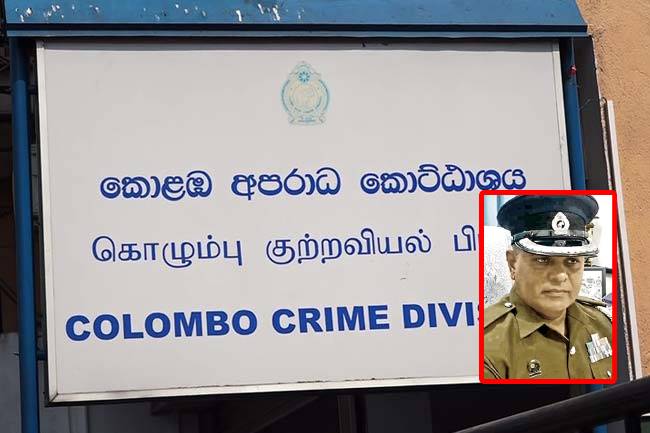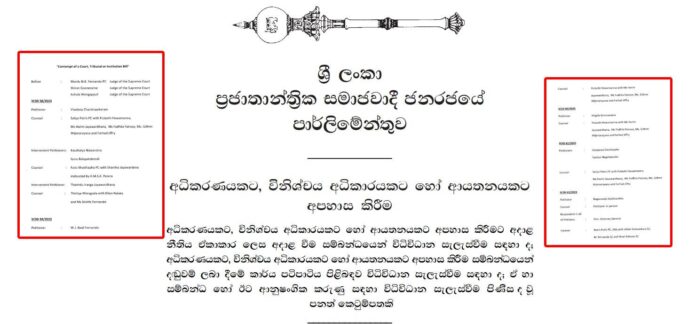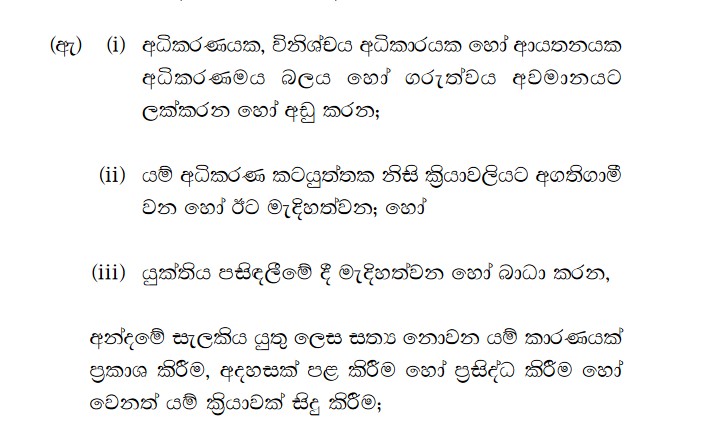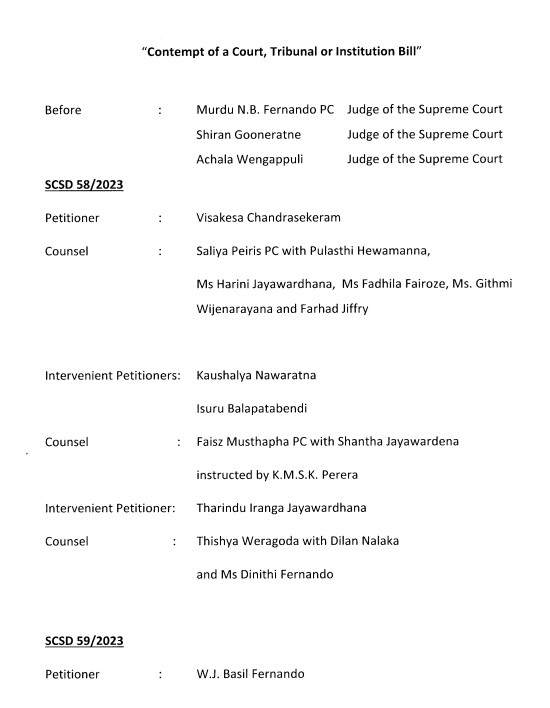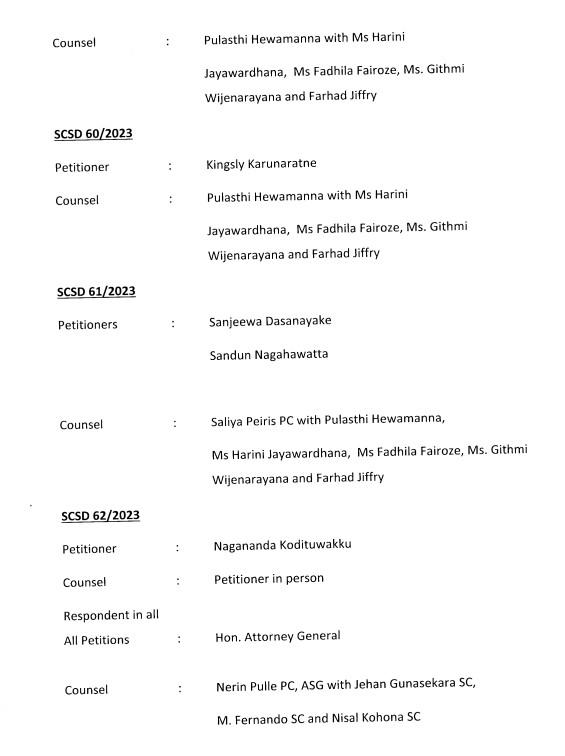අධිකරණයට අපහාස කිරීම සම්බන්ධයෙන් ආණ්ඩුව පාර්ලිමේන්තුවට ඉදිරිපත් කළ ප්රධාන වගන්ති 16කින් සමන්විත පනත් කෙටුම්පතේ වගන්ති 09කම ආණ්ඩුක්රම ව්යවස්ථාවට පටහැනි කොටස් තිබෙන බව ශ්රේෂ්ඨාධිකරණය තීන්දු කර තිබේ.
ශ්රේෂ්ඨාධිකරණයේ එම තීන්දුව කතානායකවරයා විසින් අද පාර්ලිමේන්තුවට දැනුම් දුන්නේය.
අධිකරණයට, විනිශ්චයාධිකාරයකට සහ ආයතනයකට අපහාස කිරීමේ පනත් කෙටුම්පත පාර්ලිමේන්තුවට ඉදිරිපත් කිරීමෙන් පසු එහි ව්යවස්ථානුකූල බව ප්රශ්න කරමින් ශ්රේෂ්ඨාධිකරණය වෙත පෙත්සම් පහක් සහ අතරමැදි පෙත්සම් දෙකක් ඉදිරිපත් කර තිබිණි.
ආචාර්ය විසාකේස චන්ද්රසේකරම්, නීතිඥ බැසින් ප්රනාන්දු, කිංස්ලි කරුණාරත්න, සංජය දසනායක සමග නඳුන් නාගහවත්ත සහ නාගානන්ද කොඩිතුවක්කු එහි පෙත්සම්කරුවන් වන අතර ශ්රී ලංකා නීතිඥ සංගමයේ සභාපති සහ ලේකම් ලෙස ජනාධිපති නීතිඥ කෞෂල්ය නවරත්න සහ ඉසුරු බාලපටබැඳිගේ මහත්වරු ද, මාධ්යවේදී තරිඳු ජයවර්ධන ද අතරමැදි පෙත්සම්කරුවෝ වූහ.
අගෝස්තු 04 සහ 05 යන දිනවලදී මෘදු ප්රනාන්දු, ශිරාන් ගුණරත්න සහ අචල වෙංගප්පුලි යන ශ්රේෂ්ඨාධිකරණ විනිසුරුවරුන් ඉදිරියේ මෙම පෙත්සම් සහ අතරමැදි පෙත්සම් විභාගයට ගැණිනි. එහි තීන්දුව කතානායකවරයා වෙත යොමු කිරීමෙන් පසු කතානායකවරයා අද පාර්ලිමේන්තුවට මේ බව දැනුම් දුන්නේය.
පිටු 45කින් සමන්විත එම තීන්දුව අනුව ආණ්ඩුව විසින් ඉදිරිපත් කරන ලද පනත් කෙටුම්පතේ වගන්ති රැසක් ව්යවස්ථාවට පටහැනි බව ශ්රේෂ්ඨාධිකරණය තීන්දු කර තිබේ. ඇතැම් වගන්ති නීතිපතිගේ සංශෝධන ඇතුළත් කිරීම මගින් සම්මත කළහැකි බවත්, පනතේ 11 වැනි වගන්තිය සම්මත කර ගැනීමට නම් පාර්ලිමේන්තුවේ තුනෙන් දෙකක විශේෂ බහුතරයක් අවශ්ය බවත් ශ්රේෂ්ඨාධිකරණ තීන්දු කර ඇත. 11 වැනි වගන්තියේ සඳහන් වන්නේ අධිකරණයට අපහාස කිරීමට අදාලව ලබා දෙන දඬුවමයි.
මීට පෙර ආණ්ඩුව විසින් පුණරුත්තාපන පනත් කෙටුම්පත පාර්ලිමේන්තුවට ඉදිරිපත් කළ අතර එම සම්පූර්ණ පනත් කෙටුම්පතම ව්යවස්ථාවට පටහැනි බව ශ්රේෂ්ඨාධිකරණය තීන්දු කළේය. ආණ්ඩුව ඉදිරිපත් කළ මෙවැනි තවත් පනත් කෙටුම්පත් කිහිපයකම ඇතැම් වගන්ති ව්යවස්ථාවට පටහැනි බව තීන්දු විය.
මෙම පනතේ අරමුණු සඳහන් වෙන දෙවැනි වගන්තියට ‘මහජන සාමය, මහජන සෞඛ්ය සහ සදාචාරය ආරක්ෂා කිරීම‘ යනුවෙන් සඳහන් කිරීම ආණ්ඩුක්රම ව්යවස්ථාවේ 12.1 ට අනුකූල නොවන බවත්, කෙටුම්පතේ 3.1.ආ යටතේ ඇති ‘යම් විභාග වෙමින් පවතින නඩුවකට අදාළ අධිකරණ ක්රියාවලිය සඳහා මැදිහත්වීමේ හෝ ඊට අගතියක් සිදු කිරීමේ‘ යන වගන්තිය ද ව්යවස්ථාවේ 12.1ට අනනුකූල නොවන බවත් ශ්රේෂ්ඨාධිකරණ තීන්දුවේ සඳහන් වේ.
පනත් කෙටුම්පතේ 3.ඇ වගන්තිය ද ව්යවස්ථාවට පටහැනි බව සඳහන් වේ. එම වගන්තිය පහත දැක්වේ.
මෙම පනත් කෙටුම්පතෙහි තවදුරටත් ව්යවස්ථාවට පටහැනි කරුණු ඇතුළත් වගන්තිවලට අදාලව ශ්රේෂ්ඨාධිකරණයේ තීන්දුව සම්බන්ධයෙන් කතානායකවරයා කළ දැනුම්දීම පහත දැක්වේ.
I wish to announce to Parliament that I have received the Determination of the Supreme Court in respect of the Bill titled “CONTEMPT OF A COURT, TRIBUNAL OR INSTITUTION” which was challenged in the Supreme Court in terms of Article 121(1) of the Constitution.
The Determination of the Supreme Court as to the constitutionality of the Bill titled “CONTEMPT OF A COURT, TRIBUNAL OR INSTITUTION” is as follows:—
(i) Clause 2(e) is inconsistent with Article 12(1) of the Constitution.
(ii) Clause 3(1)(b) is inconsistent with Article 12(1) of the Constitution.
However, the said inconsistency will cease, if the amendment proposed in the Determination of the Supreme Court is made to the said Clause.
Clause 3(2)(c) is inconsistent with Article 12(1) of the Constitution.
However, the Supreme Court holds that there is no inconsistency of the provisions that are contained in Clauses 3(2)(a) to 3(2)(e) with the Constitution, subject to the amendment to Clause 3(2)(c) of the Bill, as suggested by the Hon. Attorney-General.
(iii) The Supreme Court is of the view that Clause 4 is inconsistent with Article 12(1) of the Constitution.
However, if the proposed amendment as set out in the Determination of the Supreme Court is made such inconsistency would cease.
(iv) Provisions of Clause 7(3) are inconsistent with Article 13(2) of the Constitution.
However, the proposed amendment by the Hon. Attorney-General as set out in the Determination of the Supreme Court, if inserted to Clause 7(1)(b), the said inconsistency would cease.
Provisions of Clause 7(3) are also inconsistent with Article 13(3) of the Constitution.
(v) Clauses 8(1)(b), 8(1)(c), 9(1)(b) and 9(1)(c) are inconsistent with Article 12(1) of the Constitution.
However, the proposed amendment by the Hon. Attorney-General as set out in the Determination of the Supreme Court, if inserted would cease the said inconsistency in these Clauses.
(vi) The Supreme Court holds that the Clause 11, as a whole is inconsistent with the provisions of Article 12(1) of the Constitution and it could be validly passed in Parliament into Law only with a special majority with the number of votes cast in favour thereof amounts to not less than two-thirds of the whole number of Members (including those not present), as prescribed in terms of Article 84(2) of the Constitution.
(vii) The Supreme Court is of the view that Clause 12(1) is inconsistent with Article 146(2)(iv) of the Constitution.
However, the said inconsistency will cease, if the amendment indicated in the Determination of the Supreme Court is made to the said Clause.
(viii) Clause 13 will be amended at the Committee Stage of the Bill as set out in the Determination of the Supreme Court.
(ix) The Supreme Court is of the view that Clause 16 is inconsistent with Article 12 of the Constitution.
However, the inconsistency will cease, if the amendment indicated in the Determination of the Supreme Court is made to the said Clause.
I order that the Determination of the Supreme Court be printed in the Official Report of today’s proceedings of the House.
පනත් කෙටුම්පතේ පෙත්සම්කරුවන් සහ නීතිඥවරුන් පහත දැක්වේ.



